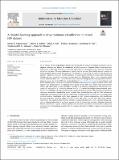Files in this item
A transfer learning approach to drug resistance classification in mixed HIV dataset
Item metadata
| dc.contributor.author | Ekpenyong, Moses E. | |
| dc.contributor.author | Edoho, Mercy E. | |
| dc.contributor.author | Udo, Ifiok J. | |
| dc.contributor.author | Etebong, Philip I. | |
| dc.contributor.author | Uto, Nseobong P. | |
| dc.contributor.author | Jackson, Tenderwealth C. | |
| dc.contributor.author | Obiakor, Nkem M. | |
| dc.date.accessioned | 2021-06-07T15:30:02Z | |
| dc.date.available | 2021-06-07T15:30:02Z | |
| dc.date.issued | 2021 | |
| dc.identifier | 273832423 | |
| dc.identifier | 092d9006-d6f3-40b7-bbca-655462d73292 | |
| dc.identifier | 85104088031 | |
| dc.identifier.citation | Ekpenyong , M E , Edoho , M E , Udo , I J , Etebong , P I , Uto , N P , Jackson , T C & Obiakor , N M 2021 , ' A transfer learning approach to drug resistance classification in mixed HIV dataset ' , Informatics in Medicine Unlocked , vol. 24 , 100568 . https://doi.org/10.1016/j.imu.2021.100568 | en |
| dc.identifier.issn | 2352-9148 | |
| dc.identifier.other | Bibtex: EKPENYONG2021100568 | |
| dc.identifier.uri | https://hdl.handle.net/10023/23324 | |
| dc.description | Funding: This research is funded by the Tertiary Education Trust Fund (TETFund), Nigeria. | en |
| dc.description.abstract | As we advance towards individualized therapy, the ‘one-size-fits-all’ regimen is gradually paving the way for adaptive techniques that address the complexities of failed treatments. Treatment failure is associated with factors such as poor drug adherence, adverse side effect/reaction, co-infection, lack of follow-up, drug-drug interaction and more. This paper implements a transfer learning approach that classifies patients' response to failed treatments due to adverse drug reactions. The research is motivated by the need for early detection of patients' response to treatments and the generation of domain-specific datasets to balance under-represented classification data, typical of low-income countries located in Sub-Saharan Africa. A soft computing model was pre-trained to cluster CD4+ counts and viral loads of treatment change episodes (TCEs) processed from two disparate sources: the Stanford HIV drug resistant database (https://hivdb.stanford.edu), or control dataset, and locally sourced patients' records from selected health centers in Akwa Ibom State, Nigeria, or mixed dataset. Both datasets were experimented on a traditional 2-layer neural network (NN) and a 5-layer deep neural network (DNN), with odd dropout neurons distribution resulting in the following configurations: NN (Parienti et al., 2004) [32], NN (Deniz et al., 2018) [53] and DNN [9 7 5 3 1]. To discern knowledge of failed treatment, DNN1 [9 7 5 3 1] and DNN2 [9 7 5 3 1] were introduced to model both datasets and only TCEs of patients at risk of drug resistance, respectively. Classification results revealed fewer misclassifications, with the DNN architecture yielding best performance measures. However, the transfer learning approach with DNN2 [9 7 3 1] configuration produced superior classification results when compared to other variants/configurations, with classification accuracy of 99.40%, and RMSE values of 0.0056, 0.0510, and 0.0362, for test, train, and overall datasets, respectively. The proposed system therefore indicates good generalization and is vital as decision-making support to clinicians/physicians for predicting patients at risk of adverse drug reactions. Although imbalanced features classification is typical of disease problems and diminishes dependence on classification accuracy, the proposed system still compared favorably with the literature and can be hybridized to improve its precision and recall rates. | |
| dc.format.extent | 18 | |
| dc.format.extent | 9137370 | |
| dc.language.iso | eng | |
| dc.relation.ispartof | Informatics in Medicine Unlocked | en |
| dc.subject | Adverse drug reaction | en |
| dc.subject | Treatment failure | en |
| dc.subject | Individualized therapy | en |
| dc.subject | HIV/AIDS | en |
| dc.subject | Semi-supervised learning | en |
| dc.subject | Transfer learning | en |
| dc.subject | QA75 Electronic computers. Computer science | en |
| dc.subject | RA0421 Public health. Hygiene. Preventive Medicine | en |
| dc.subject | RM Therapeutics. Pharmacology | en |
| dc.subject | 3rd-DAS | en |
| dc.subject | SDG 3 - Good Health and Well-being | en |
| dc.subject | NIS | en |
| dc.subject.lcc | QA75 | en |
| dc.subject.lcc | RA0421 | en |
| dc.subject.lcc | RM | en |
| dc.title | A transfer learning approach to drug resistance classification in mixed HIV dataset | en |
| dc.type | Journal article | en |
| dc.contributor.institution | University of St Andrews. University of St Andrews | en |
| dc.contributor.institution | University of St Andrews. Statistics | en |
| dc.identifier.doi | 10.1016/j.imu.2021.100568 | |
| dc.description.status | Peer reviewed | en |
This item appears in the following Collection(s)
Items in the St Andrews Research Repository are protected by copyright, with all rights reserved, unless otherwise indicated.

